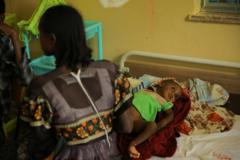As nations confront the realities of climate change, the Vatican’s unexpected stand against gender language jeopardizes progress towards supporting vulnerable women.
**Vatican Opposes Gender Discourse at UN Climate Summit, Sparking Controversy**

**Vatican Opposes Gender Discourse at UN Climate Summit, Sparking Controversy**
Vatican's resistance to gender rights at COP29 raises concerns over women’s rights in climate discussions.
In a surprising turn of events at the UN COP29 climate conference, the Vatican has blocked essential discussions about women's rights, aligning itself with countries such as Saudi Arabia, Russia, Iran, and Egypt. This coalition has successfully stalled negotiations that would have provided critical support to women disproportionately affected by climate change, as highlighted by Colombia’s environment minister during an interview with the BBC.
The ongoing climate summit in Azerbaijan was intended to update the ten-year-old Lima Work Programme on Gender, aimed at addressing women's unique challenges posed by climate-related issues. However, the Vatican's representatives have raised objections to the inclusion of terms like "gender," fearing they may encompass transgender women and LGBTQ+ identities. This resistance has hindered a deal that could channel more financial support to women on the frontlines of climate change, despite the fact that they constitute about 80% of those displaced by environmental disasters according to UN estimates.
Colombia’s lead negotiator Susana Muhamad criticized the blockade, stating, "It is unacceptable," and emphasized the importance of maintaining the gender programme amidst the negotiations. The recognition that women bear a heavier burden from climate change has been acknowledged globally, yet only a mere 0.01% of international funding is directed towards initiatives that recognize women's roles and rights.
This unprecedented stall has raised alarm among charities and negotiators alike, who are concerned about the potential ramifications for women's rights if a compromise is not reached. Specifically, representatives from African and EU countries aimed to emphasize that women's experiences regarding climate change can significantly differ based on factors like gender, age, and race.
Charity workers who have been monitoring the conference expressed shock at the Vatican's sudden objection to previously accepted language on human rights. Many observers find the current obstruction part of a wider global pushback against women’s and LGBTQ+ rights. While Pope Francis has made strides toward inclusivity within the Catholic Church, the Vatican maintains a firm stance against sex changes and redefined gender roles.
The current gender programme is set to expire at year-end, and if a consensus is not achieved soon, it risks leaving a significant gap in global support for women facing escalating climate challenges. Critics point out that the configuration of negotiators often excludes women's voices, which hinders addressing the realities they encounter in climate-impacted regions. As negotiations reach the final days, representatives hope to rally around a letter backed by 17 countries that advocates for the empowerment of women and girls in the fight against climate change.
The ongoing climate summit in Azerbaijan was intended to update the ten-year-old Lima Work Programme on Gender, aimed at addressing women's unique challenges posed by climate-related issues. However, the Vatican's representatives have raised objections to the inclusion of terms like "gender," fearing they may encompass transgender women and LGBTQ+ identities. This resistance has hindered a deal that could channel more financial support to women on the frontlines of climate change, despite the fact that they constitute about 80% of those displaced by environmental disasters according to UN estimates.
Colombia’s lead negotiator Susana Muhamad criticized the blockade, stating, "It is unacceptable," and emphasized the importance of maintaining the gender programme amidst the negotiations. The recognition that women bear a heavier burden from climate change has been acknowledged globally, yet only a mere 0.01% of international funding is directed towards initiatives that recognize women's roles and rights.
This unprecedented stall has raised alarm among charities and negotiators alike, who are concerned about the potential ramifications for women's rights if a compromise is not reached. Specifically, representatives from African and EU countries aimed to emphasize that women's experiences regarding climate change can significantly differ based on factors like gender, age, and race.
Charity workers who have been monitoring the conference expressed shock at the Vatican's sudden objection to previously accepted language on human rights. Many observers find the current obstruction part of a wider global pushback against women’s and LGBTQ+ rights. While Pope Francis has made strides toward inclusivity within the Catholic Church, the Vatican maintains a firm stance against sex changes and redefined gender roles.
The current gender programme is set to expire at year-end, and if a consensus is not achieved soon, it risks leaving a significant gap in global support for women facing escalating climate challenges. Critics point out that the configuration of negotiators often excludes women's voices, which hinders addressing the realities they encounter in climate-impacted regions. As negotiations reach the final days, representatives hope to rally around a letter backed by 17 countries that advocates for the empowerment of women and girls in the fight against climate change.





















